© 2025 Center for Digital Innovation and AI
L’Unité des nouvelles technologies éducatives (UNTE), avec le support financier de l’Agence universitaire de la francophonie (AUF), a organisé une formation à distance qui s’étale sur 4 jours les 4, 5 , 6 et 7 décembre 2023 animée par Dr. Narjess Touzani, Directrice du Département de l’Enseignement virtuel de Tunisie (UVT) et formatrice dans le domaine du développement des technologies éducatives et de l’informatique à distance à l’adresse des référents numériques de l’USJ autour de l’intelligence artificielle dans le monde de l’éducation
La formation a réuni plus de vingt participants engagés dans la mise en œuvre de la technologie à l’Université Saint-Joseph et a fourni une discussion sur l’intelligence artificielle qui se concentre les concepts de base de l’IA, les impacts de l’IA sur l’éducation, les avantages, défis et enjeux. Au niveau pratique, les participants ont été accompagnés dans la création de contenus pédagogiques adaptés mais aussi de nouvelles activités avec l’usage de récents outils de l’IA. Il est important de mentionner que les participants sont les référents numériques à l’Université, dans le sens où ils assurent un rôle de mutualisation et de formation auprès des pairs dans leurs institutions en collaboration avec l’UNTE.
Jour 1 – 4 décembre 2023: Introduction à l’IA – définitions, concepts de base. Dr. Touzani a présenté le sujet et a donné une définition de l’intelligence artificielle qui consiste en un ensemble de théories et de techniques mises en œuvre en vue de réaliser des machines capables de simuler l’intelligence. Elle a également expliqué que l’IA repose sur des algorithmes qui permettent aux machines d’imiter une forme d’intelligence humaine. En deuxième temps, un travail de groupe a été réalisé pour échanger autour de l’impact de l’IA sur l’éducation et les enjeux éthiques.
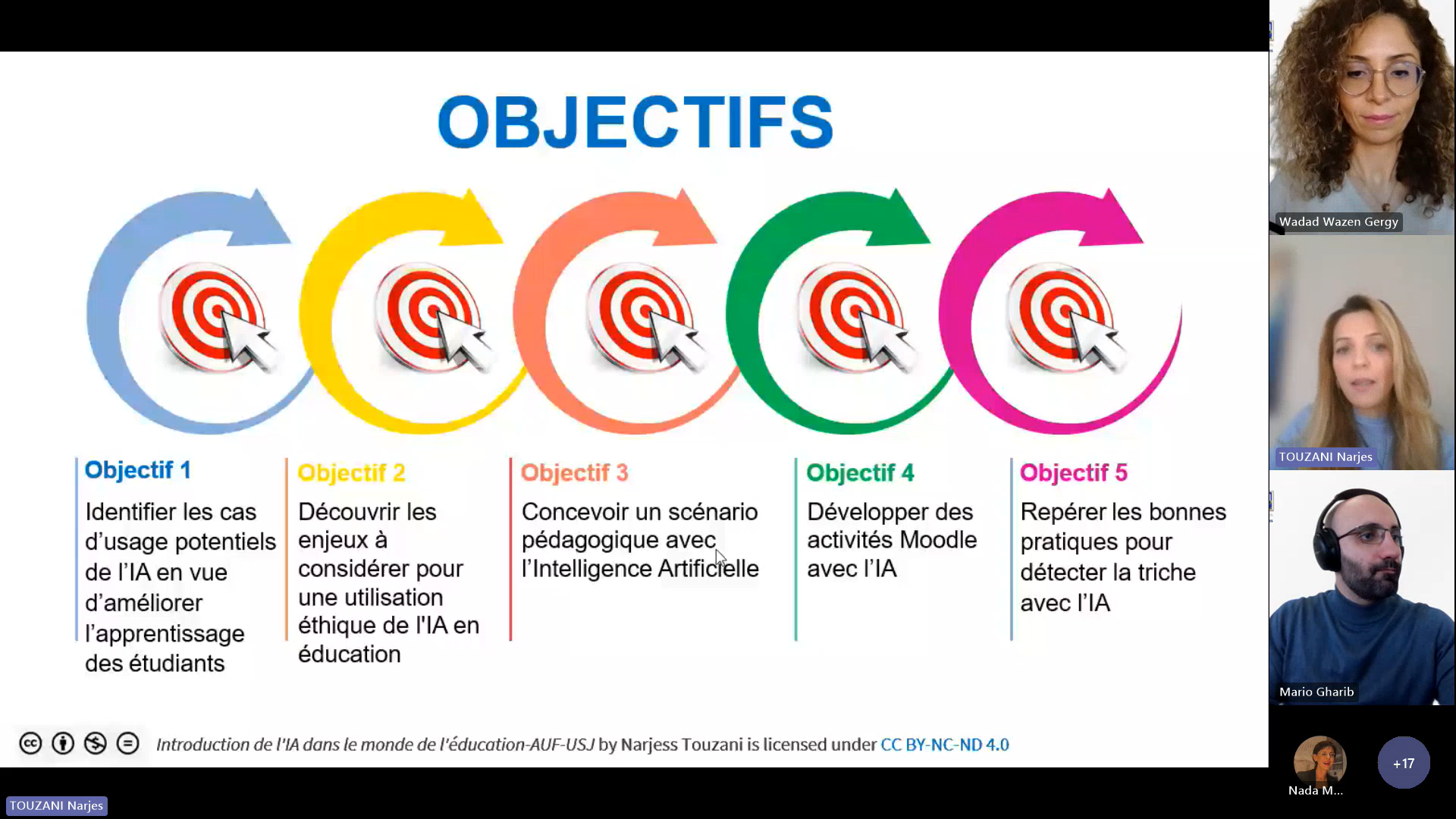
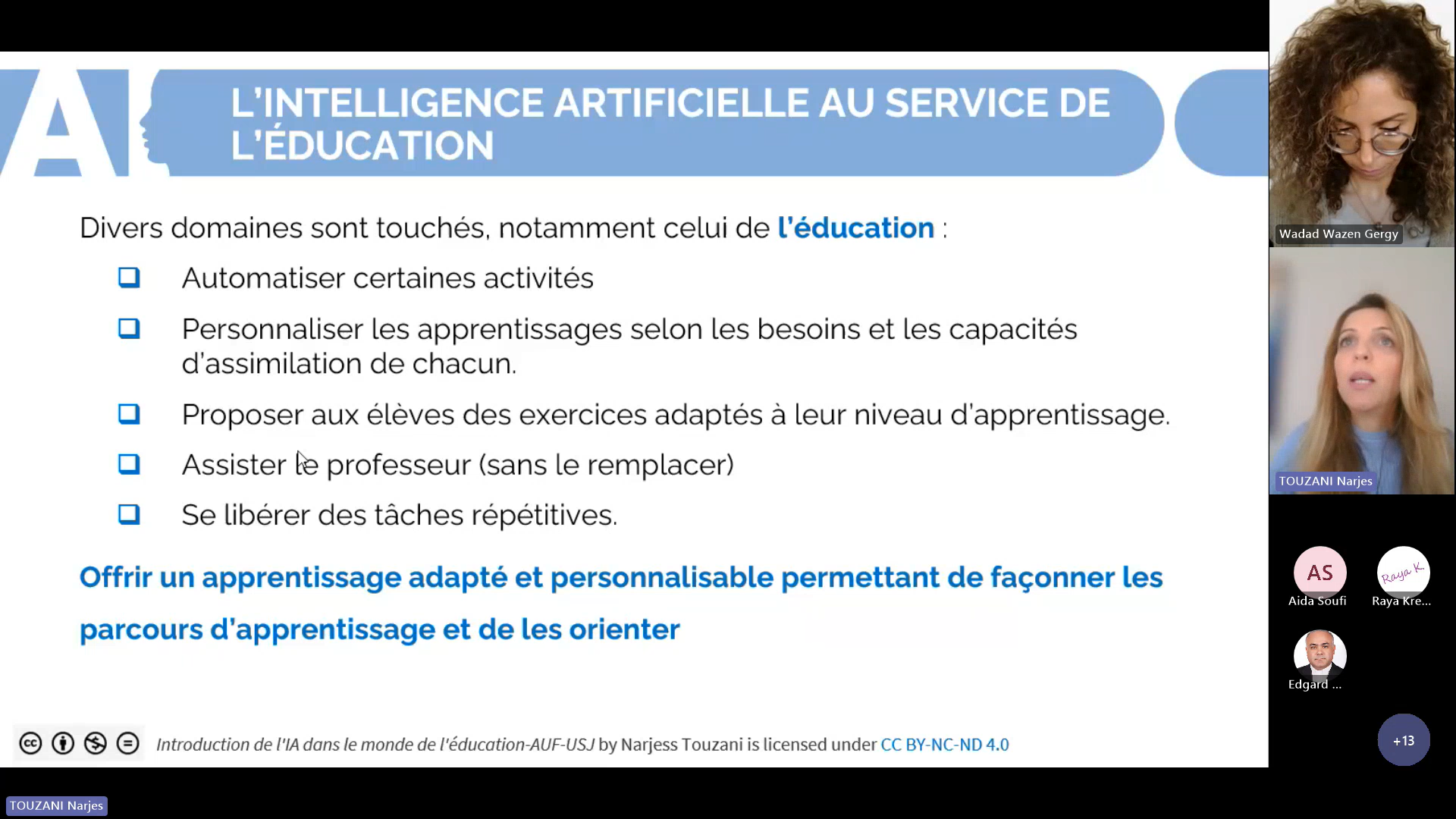
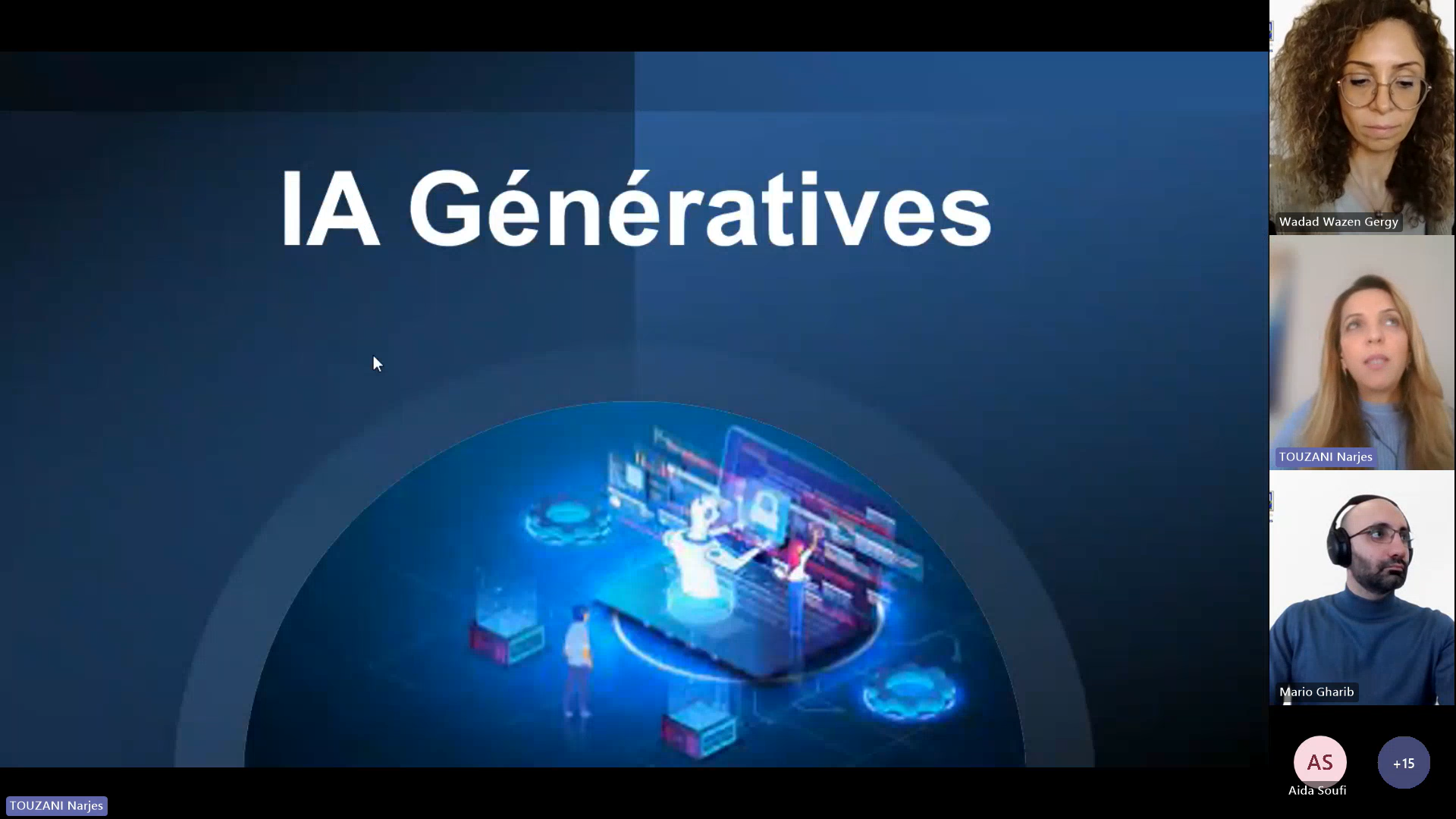
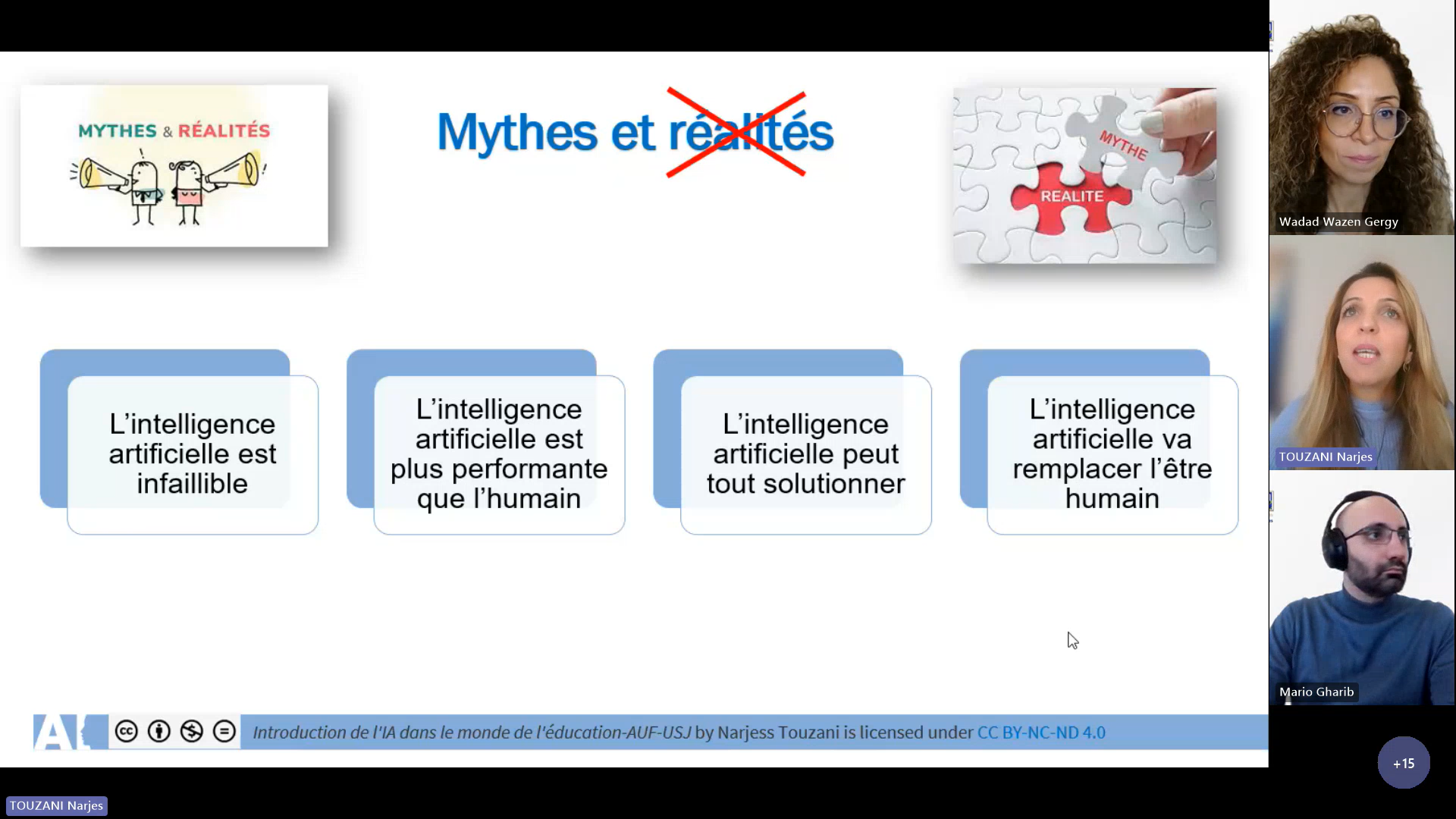
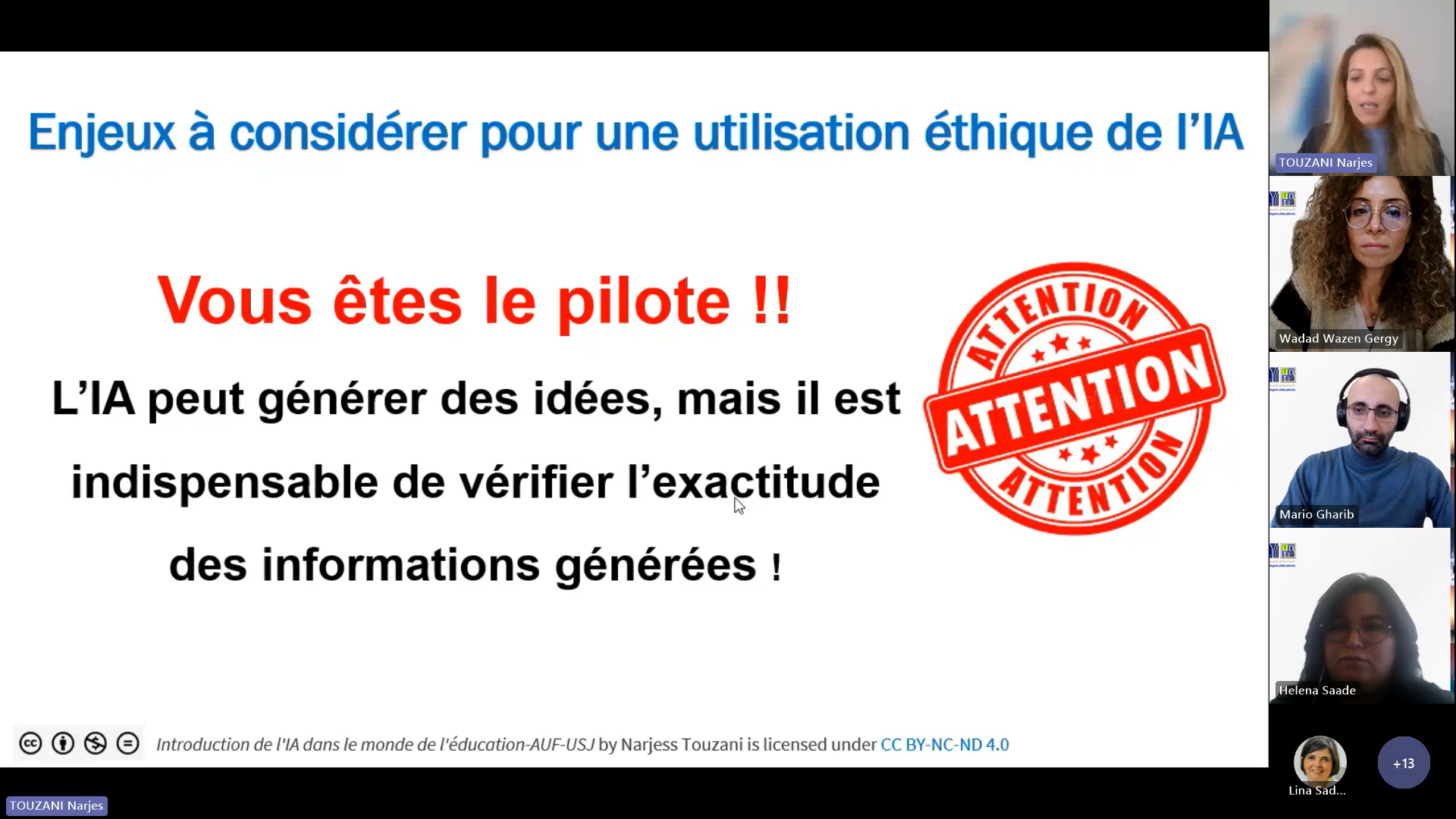
Enregistrement Jour 1 :
Pour accéder à l’enregistrement, prière de cliquer sur ce lien.
Remarque : l’enregistrement est uniquement accessible par la communauté USJ.
Jour 2 – 5 décembre 2023: Dans une ambiance participative, les référents ont été invités à participer dans des activités pour modifier leurs scenarios pédagogiques, Dr Touzani les a encouragés à adapter leurs méthodes d’enseignement et leur design pédagogiques pour profiter de l’assistance de l’intelligence artificielle. Des groupes de travail ont été formés et les rencontres de partage et d’échange ont montré que nous pouvons bénéficier des outils de l’intelligence artificielle pour créer des scenarios pédagogiques modernisés avec le support de l’IA. Plusieurs outils ont été exposes, a savoir le Chat Generator Prompts, Chat Writer, et autres.
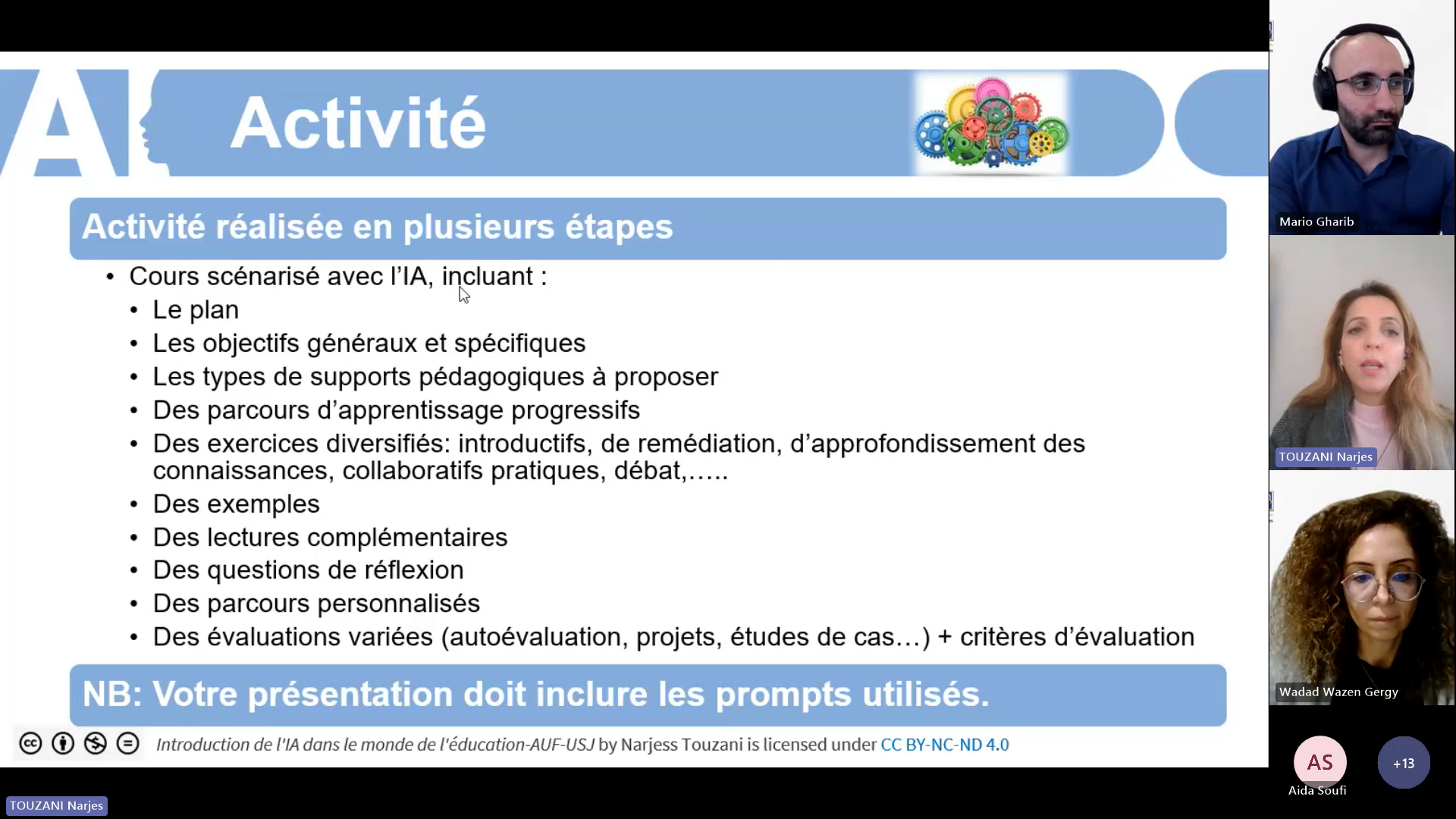
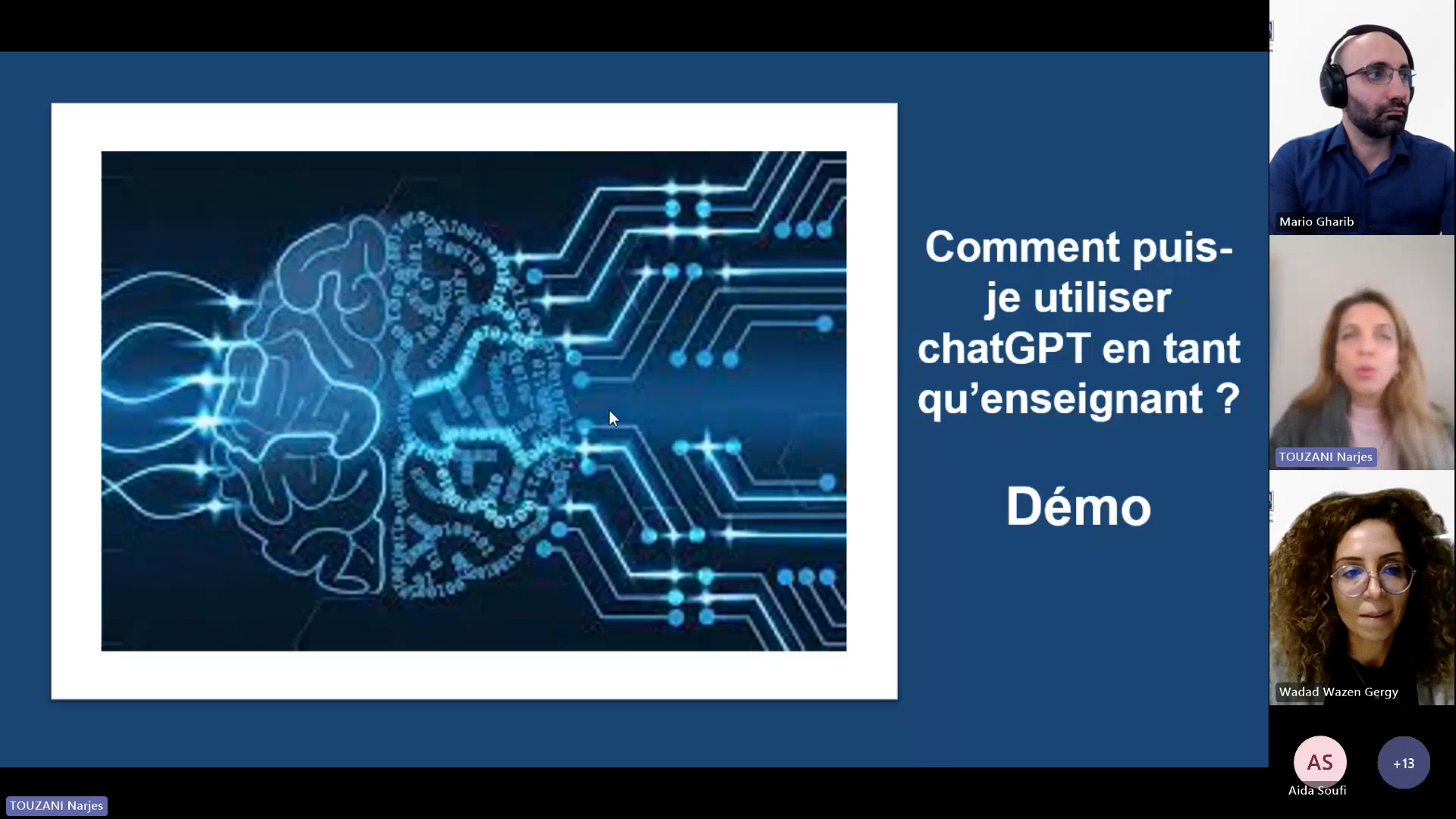
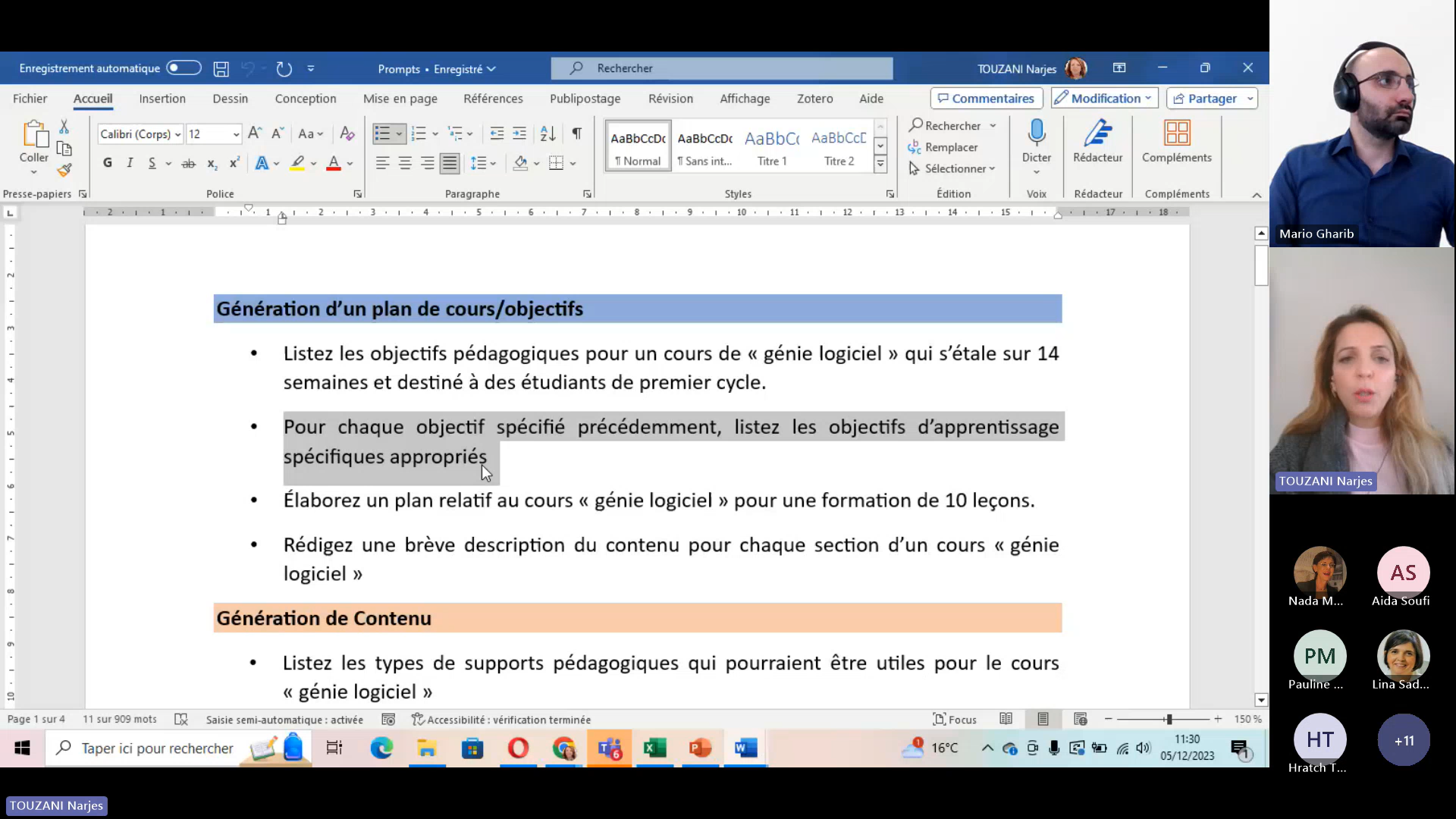
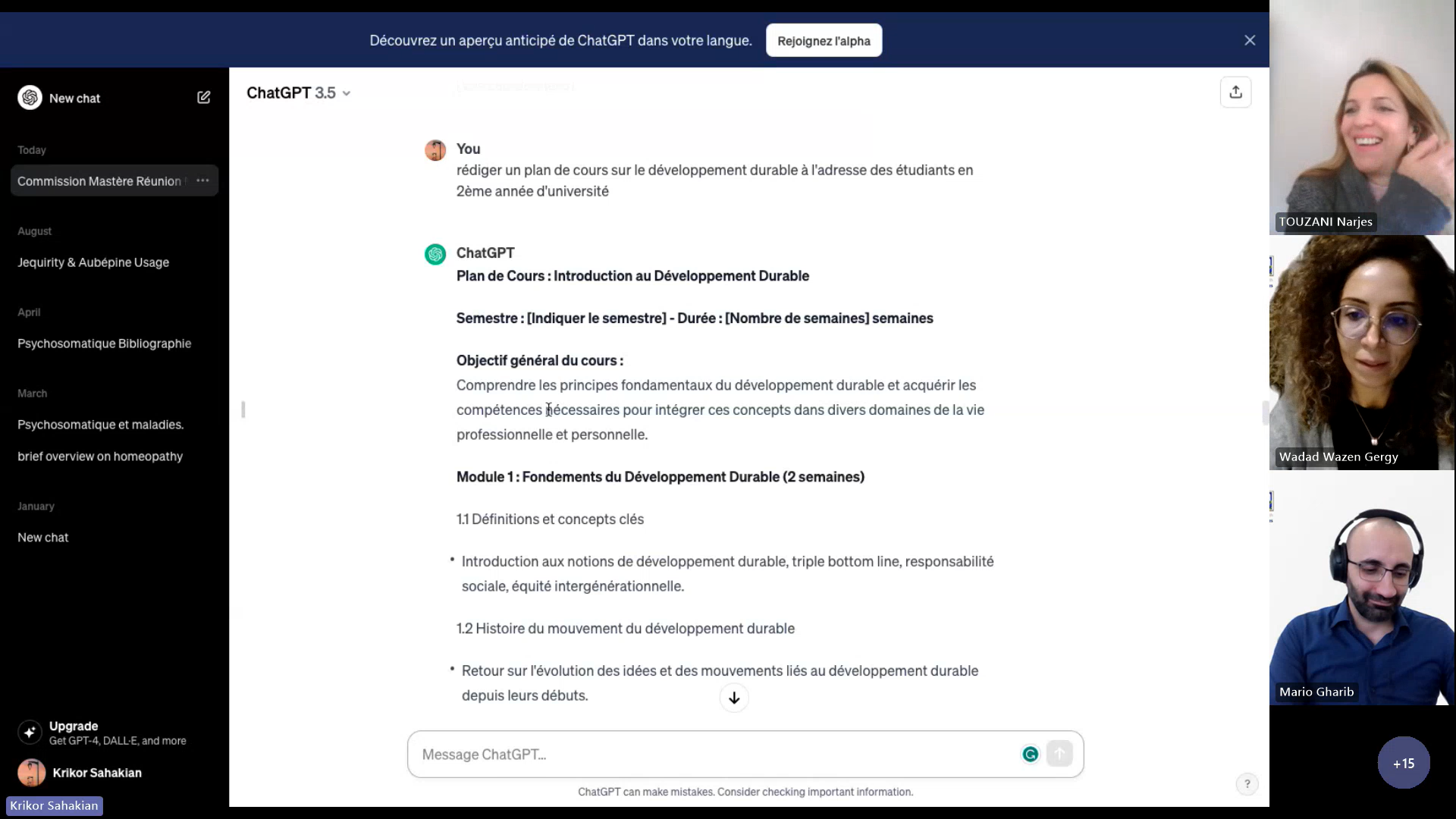
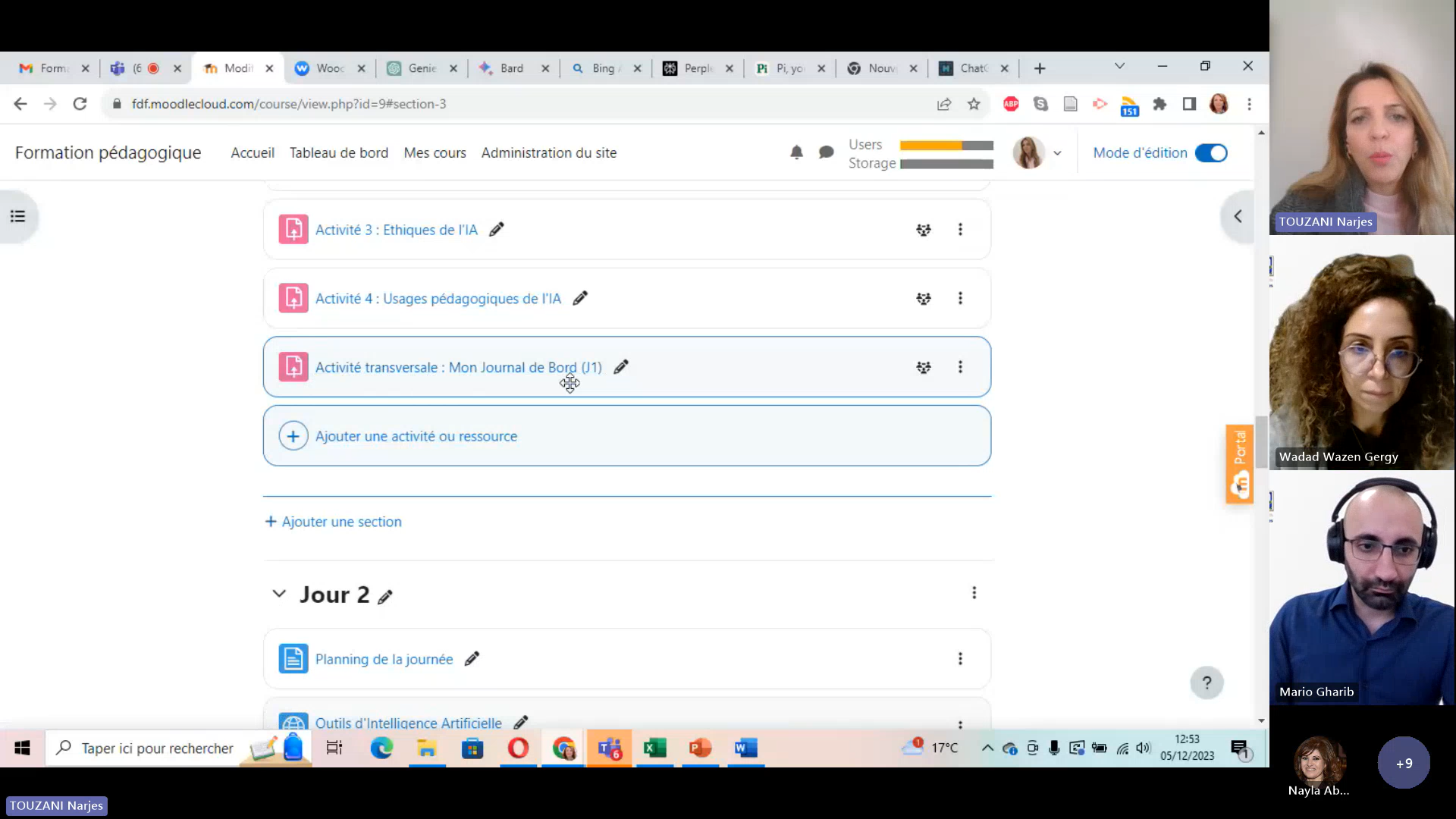
Enregistrement Jour 2 :
Pour accéder à l’enregistrement, prière de cliquer sur ce lien.
Remarque : l’enregistrement est uniquement accessible par la communauté USJ.
Jour 3 – 6 décembre 2023: Au cours de cette session, Dr Touzani a expliqué comment concevoir et créer des activités pédagogiques avec l’IA. En fait, il s’agit de créer des contenus pédagogiques adaptés et de personnaliser l’apprentissage avec les nouveaux outils de l’intelligence artificielle. Plus encore, les participants ont assisté à un exposé pratique sur un parcours d’apprentissage progressif adapté se basant sur les théories en éducation (Taxonomie de Bloom par exemple). Plusieurs outils ont été testés par les participants.
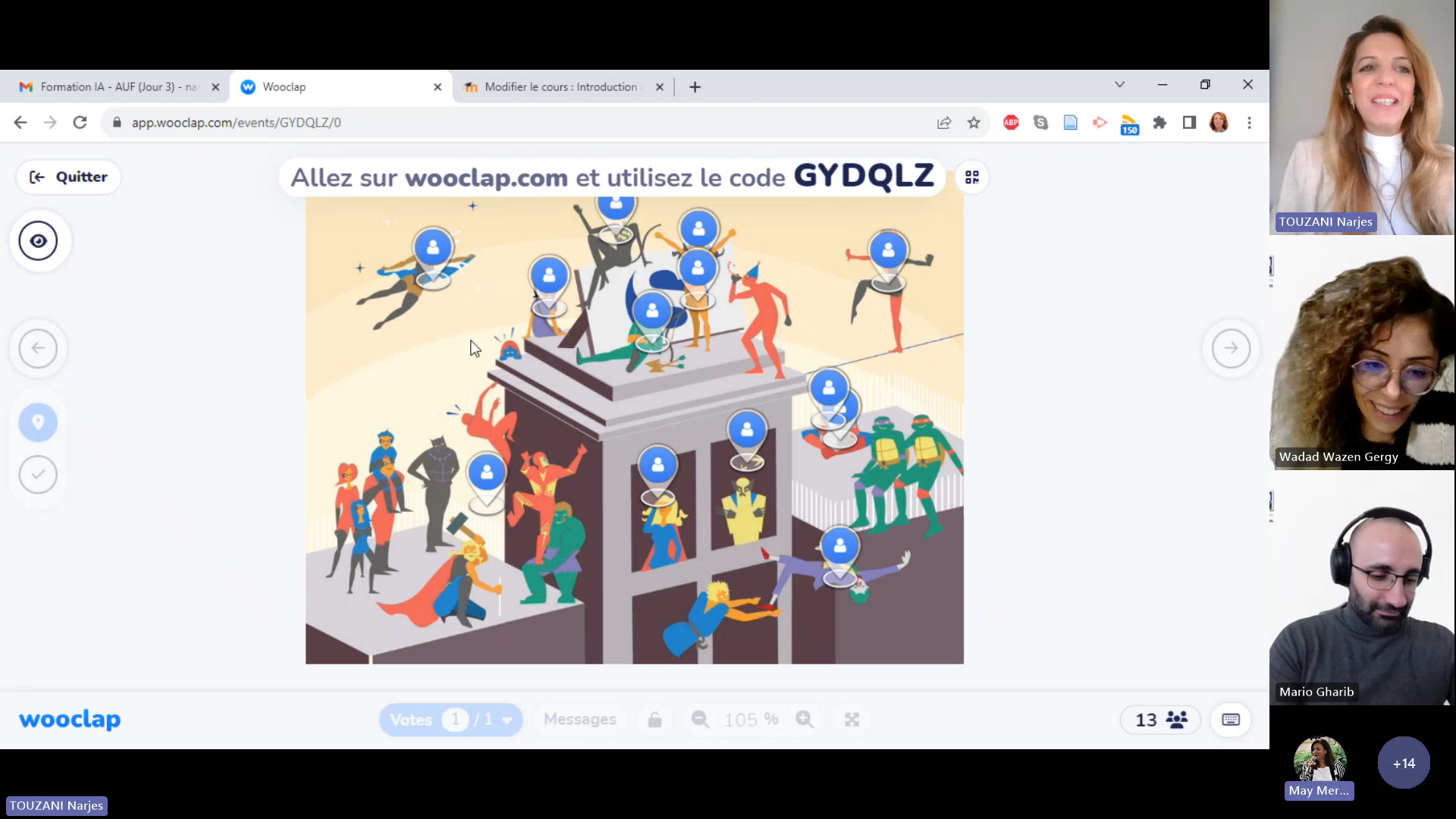
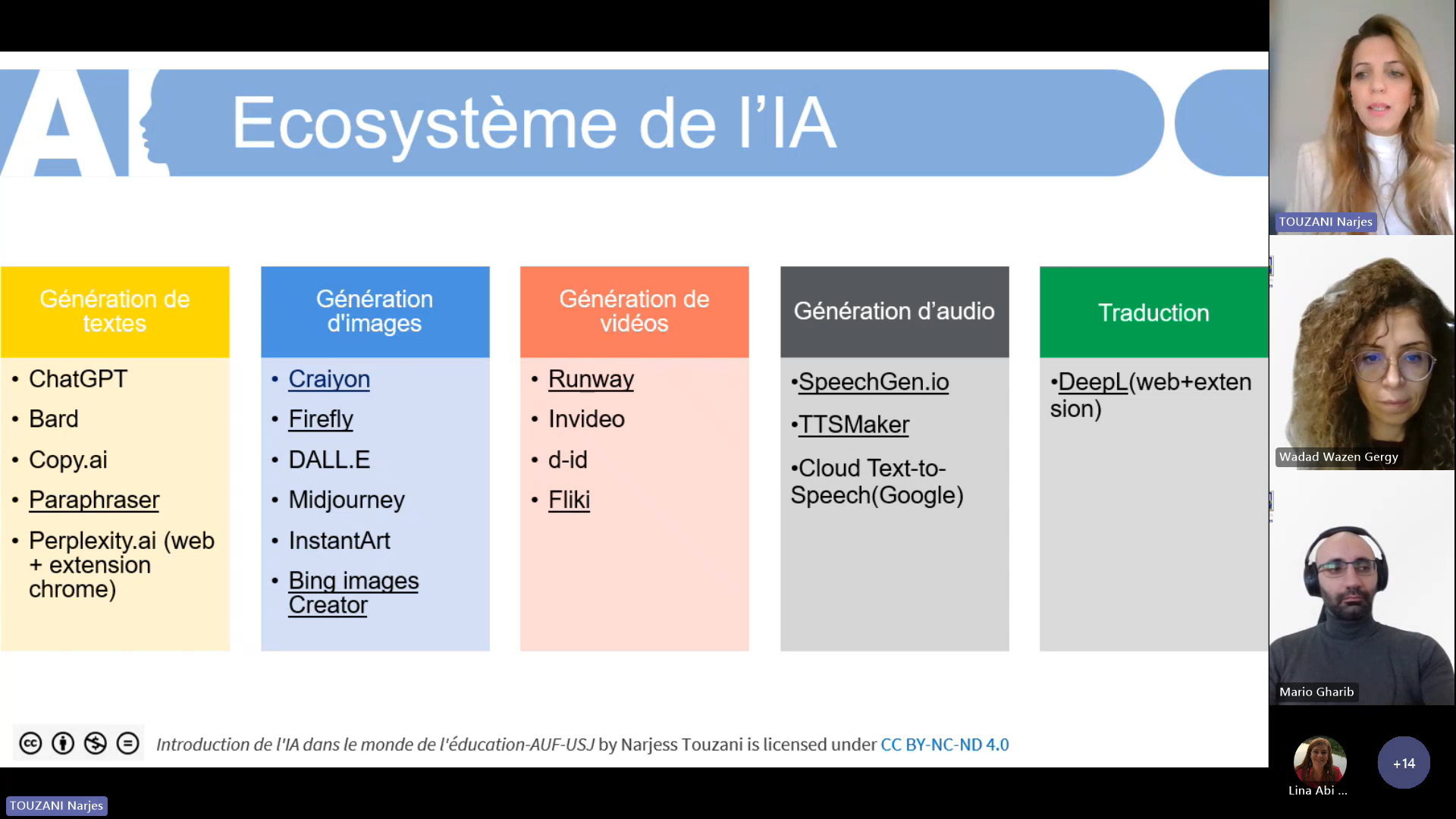
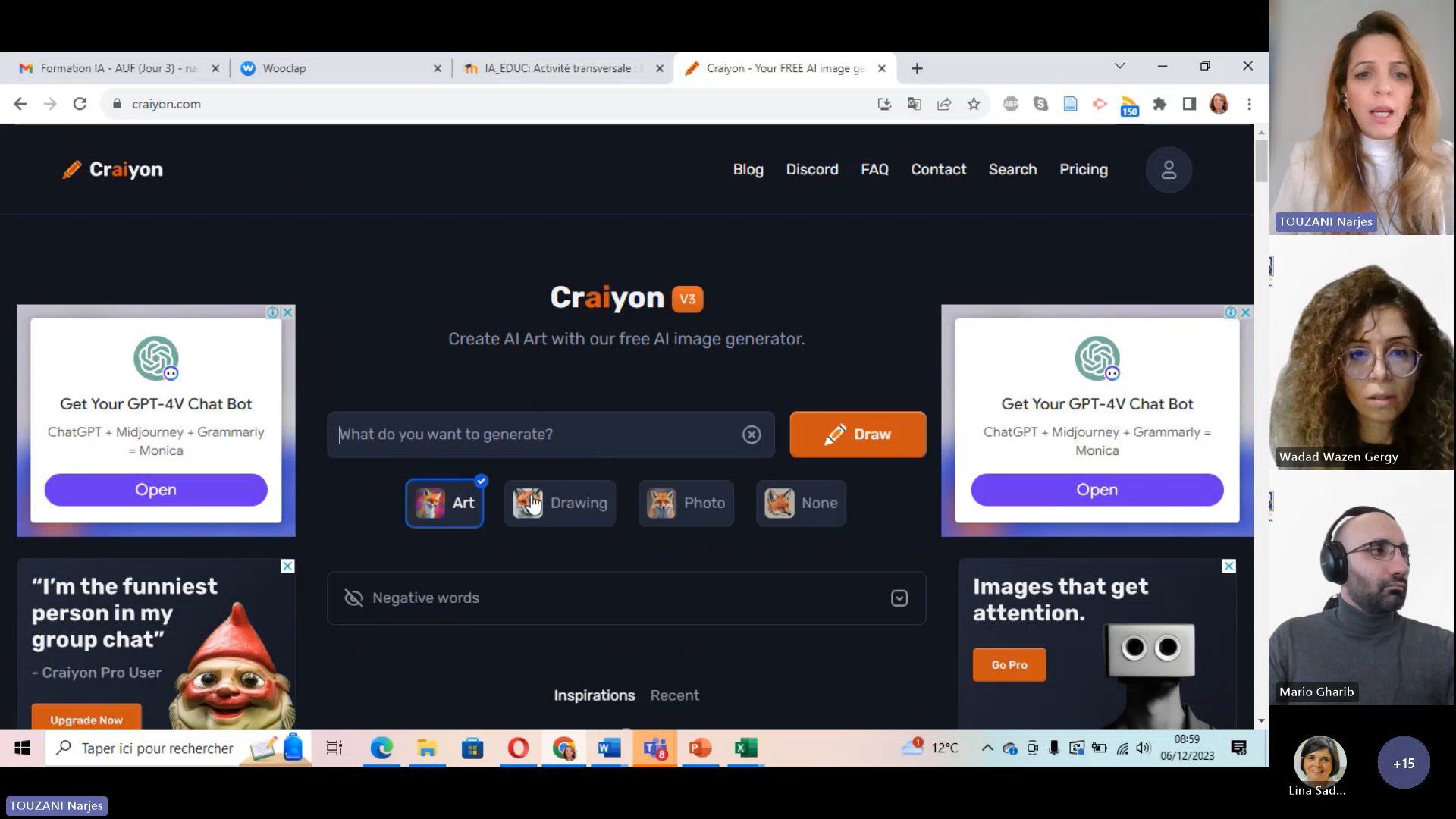
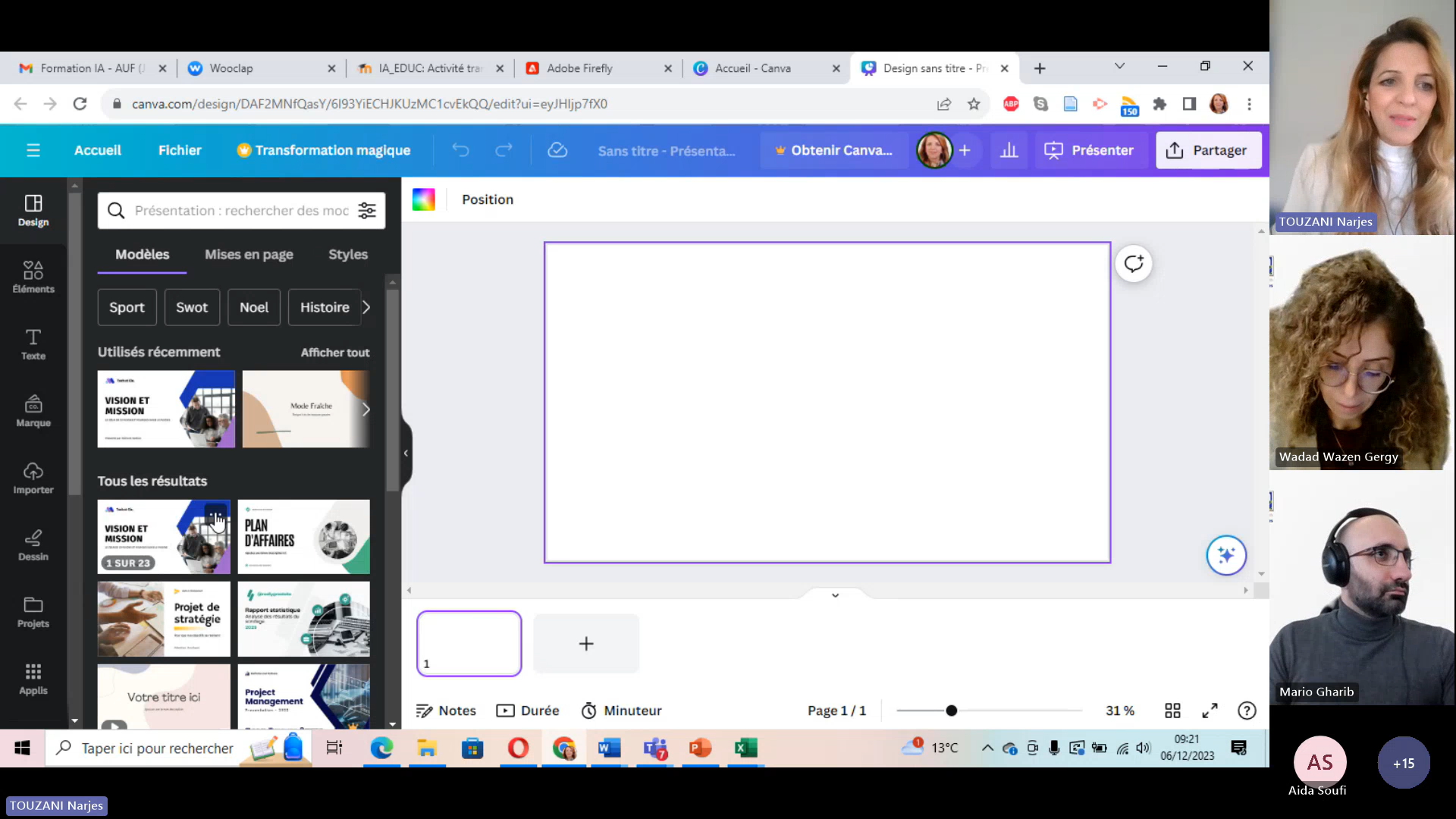
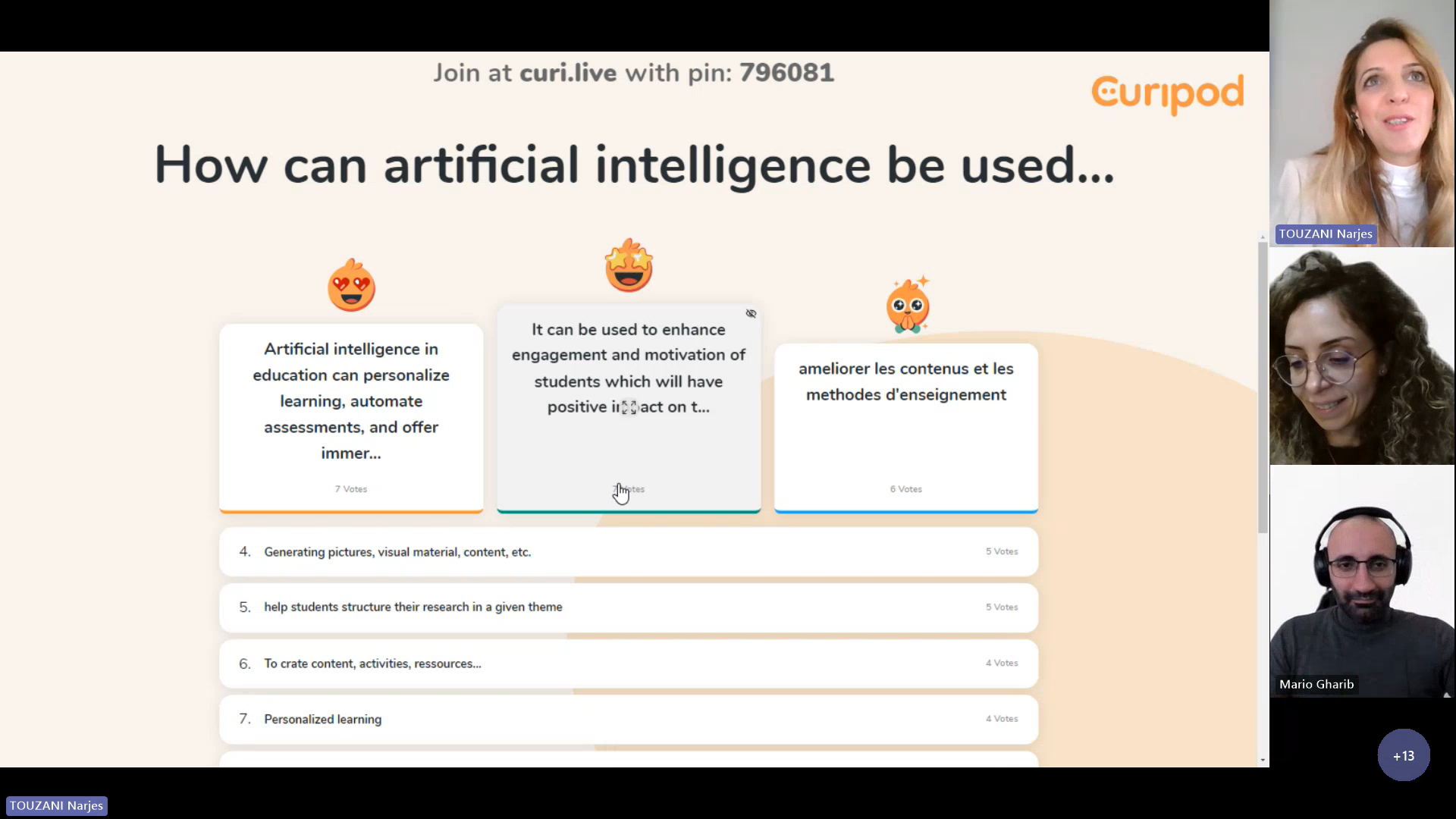
Enregistrement Jour 3:
Pour accéder à l’enregistrement, prière de cliquer sur ce lien.
Remarque : l’enregistrement est uniquement accessible par la communauté USJ.
Jour 4 – 7 décembre 2023: Au cours de cette séance, deux thématiques ont été soulevées : comment evaluer les acquis des étudiants avec l’intelligence artificielle et comment détecter les fraudes académiques. Plus encore, de nouveaux outils ont été manipulés aussi, à savoir Questionwell et Conker pour la génération d’examens sous forme QCM, vrai ou faux et l’exportation de l’ensemble des questions vers Moodle, Kahoot ou autres, Diffit pour la conception de ressources. Également, les participants ont été accompagnés pour la rédaction des prompts et l’élaboration de matériel et même d’un glossaire.
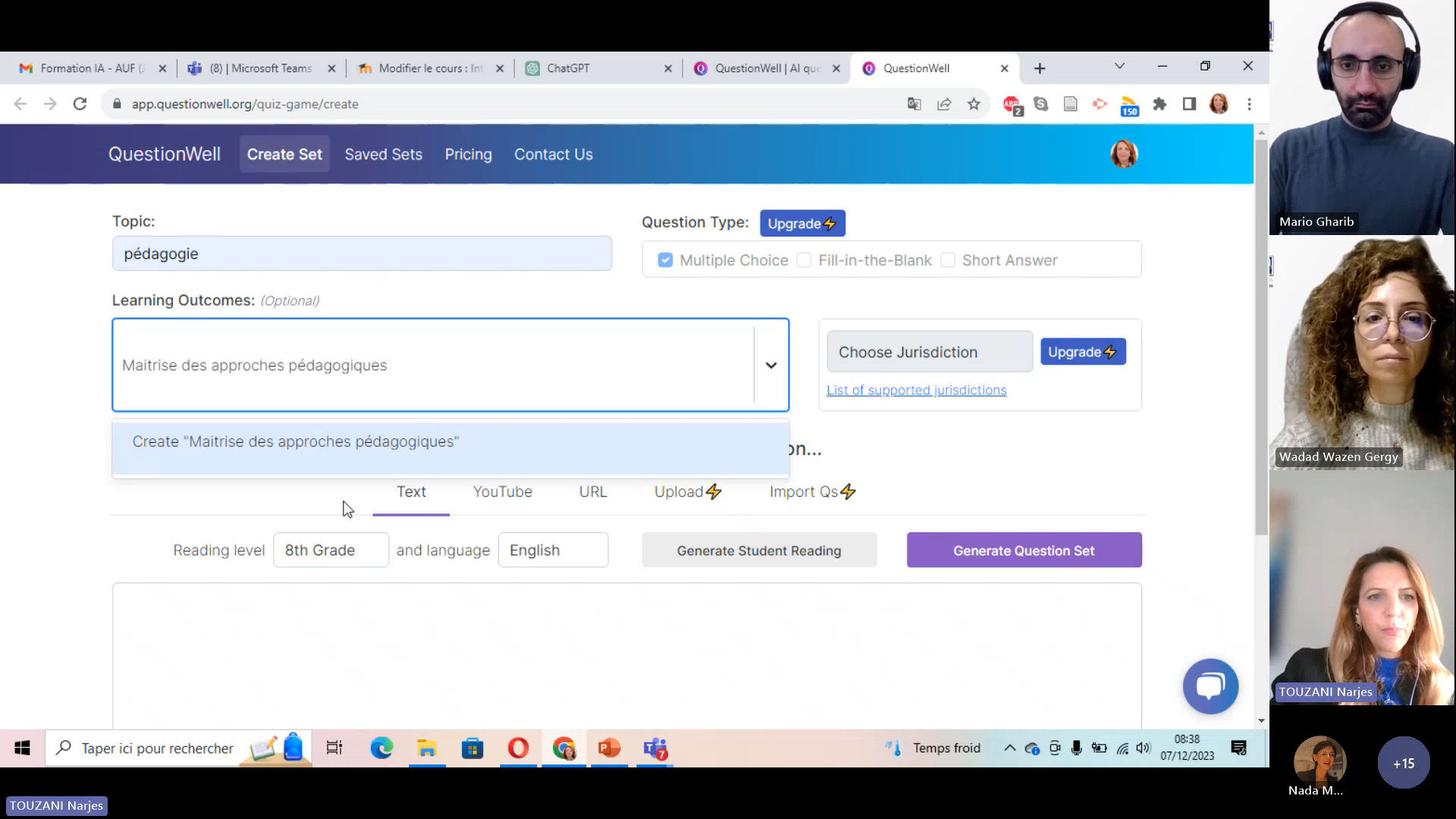
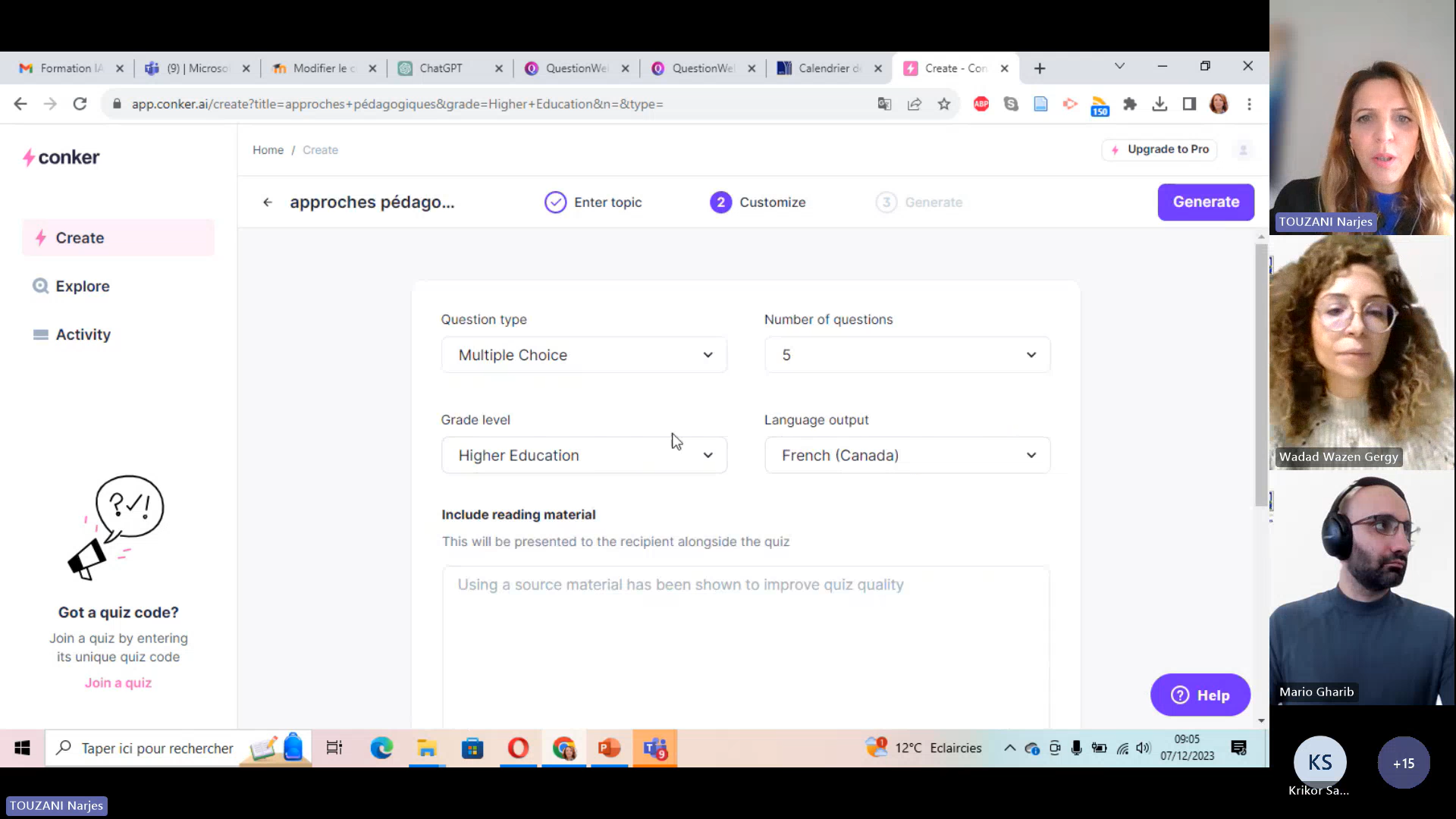
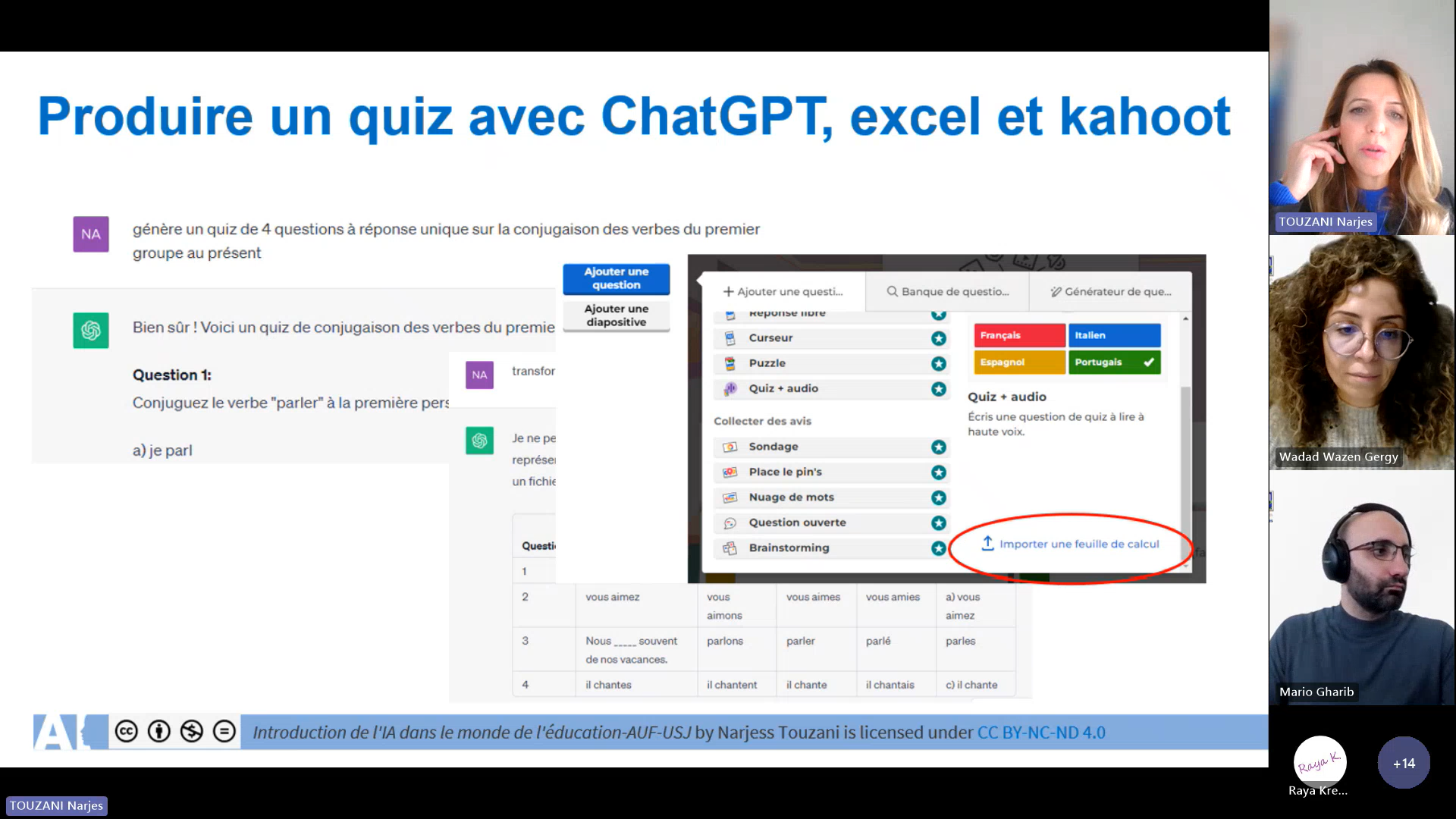
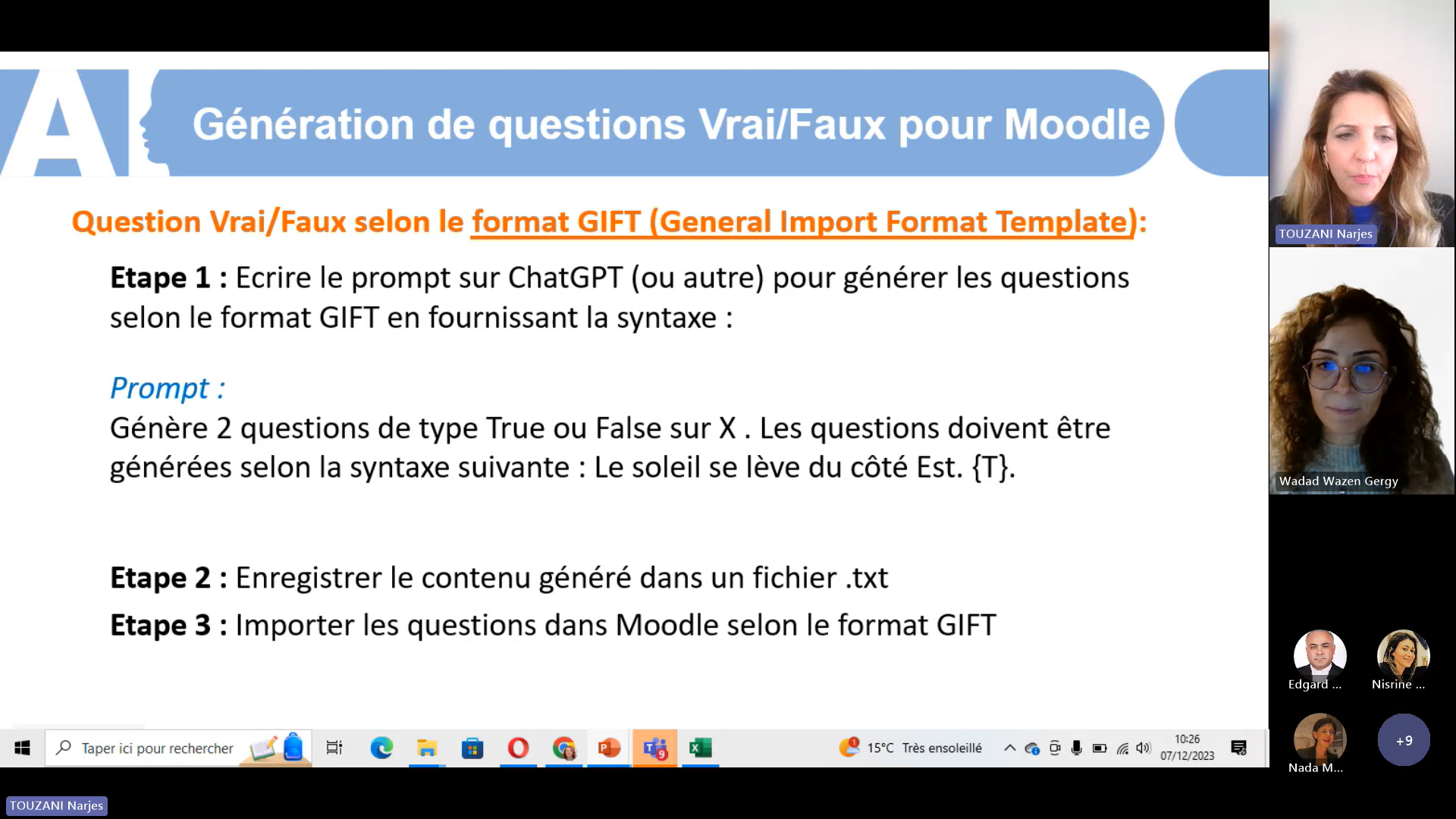
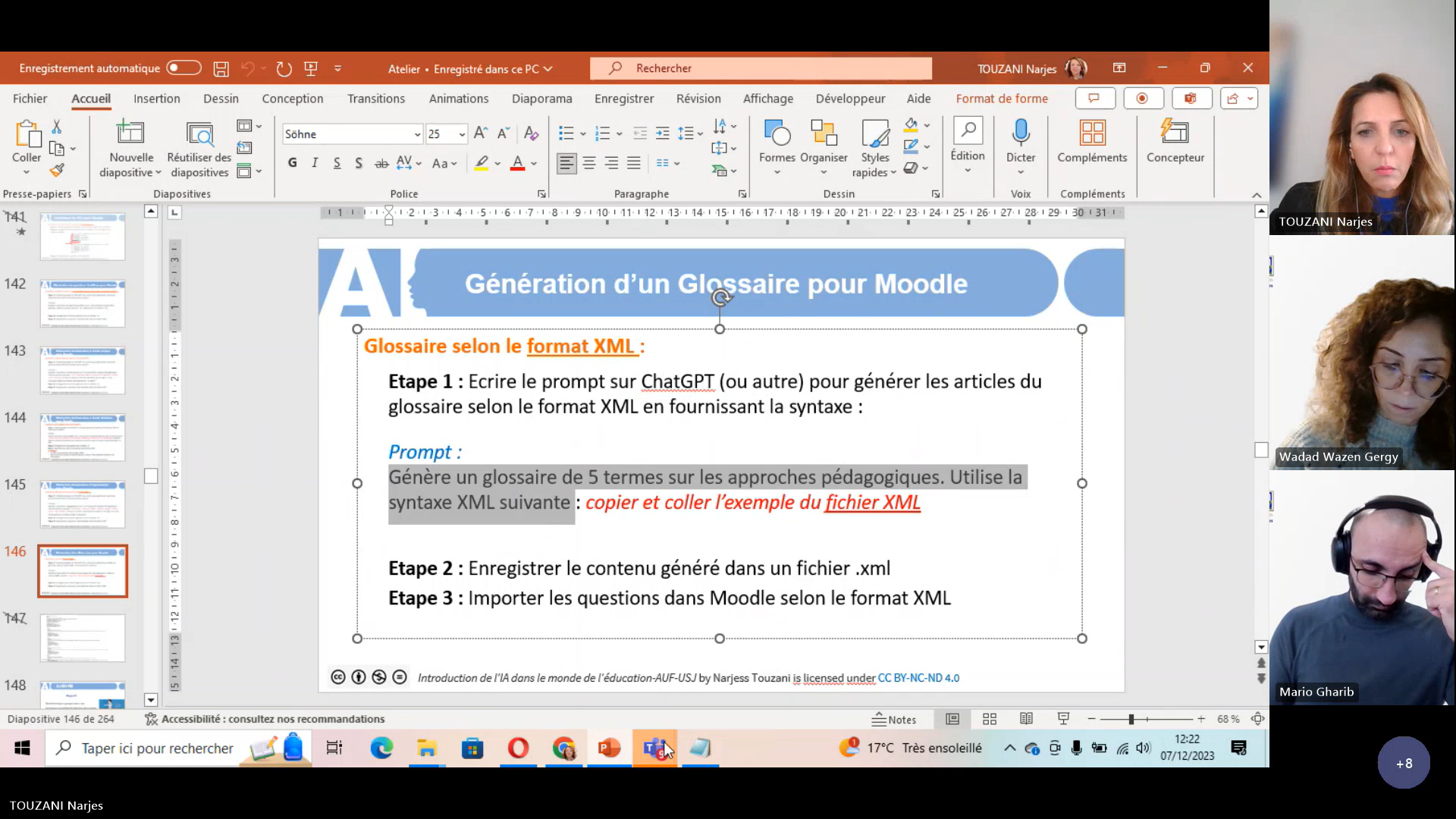
A la fin de l’atelier, les participants ont été appelés à évaluer les 4 jours de travail. Dr. Touzani les a invités à passer un petit test pour évaluer leur niveau de progression suite à la formation. Tous les participants ont fait part d’une entière satisfaction quant aux nouveaux outils et à la façon dont l’atelier a été animé en mêlant théorie et pratique.
The Unit for New Educational Technologies (UNTE), with the financial support of the Agence universitaire de la francophonie (AUF), organized a four-day online training from 4 to 7 December 2023. The training was led by Dr. Narjess Touzani, Director of the Virtual Teaching Department of Tunisia (UVT) and a trainer in the field of educational technology development and distance learning. Targeting digital coordinators from Saint-Joseph University (USJ), the training aimed to sharpen their expertise in leveraging AI in the field of education.
This impactful training session convened more than twenty participants actively engaged in implementing technological advancements at Saint-Joseph University. Dr. Touzani navigated the sessions, covering fundamental concepts of AI, its implications in education, benefits, challenges, and ethical considerations. The training also provided practical guidance, allowing participants to create tailored educational content and explore innovative activities employing recent AI tool
It’s crucial to highlight that the participants serve as digital coordinators in the University. This role involves disseminating knowledge and offering training to their fellow peers at their respective institutions in partnership with UNTE.
Sessions Highlights:
Day 1 – Monday 4 December 2023: Introduction to AI – Definitions, Basic Concepts: Dr. Touzani initiated the session by introducing the topic and offering a comprehensive definition of artificial intelligence (AI) as a collection of theories and techniques employed to develop machines capable of simulating intelligence. She elaborated on how AI relies on algorithms, enabling machines to replicate a semblance of human intelligence. Also, a group work session was conducted, fostering discussions on the influence of AI on education and ethical considerations surrounding its implementation.





Recording Day 1 :
To access the recording, kindly click on this link.
Remark: the recording is only accessible by the USJ community.
Day 2 – Tuesday 5 December 2023: In a participatory environment, the digital coordinators were invited to engage in activities to modify their pedagogical scenarios. Dr. Touzani encouraged them to adapt their teaching methodologies and pedagogical designs by harnessing the potential of artificial intelligence. Workgroups were established, facilitating sharing and exchange sessions that highlighted the advantages of utilizing artificial intelligence tools to develop contemporary pedagogical scenarios with AI support. The session featured presentations on various tools, including the Chat Generator Prompts, Chat Writer, and several others.





Recording Day 2 :
To access the recording, kindly click on this link.
Remark: the recording is only accessible by the USJ community.
Day 3 – Wednesday 6 December 2023: In this session, Dr. Touzani explained the process of designing and crafting educational activities utilizing AI. The emphasis was on creating customized educational content and individualizing learning experiences through the integration of new artificial intelligence tools. Similarly, participants observed a practical demonstration illustrating a customized progressive learning path aligned with educational theories, including Bloom’s Taxonomy. Numerous tools were tested by the participants during this interactive session.





Recording Day 3 :
To access the recording, kindly click on this link.
Remark: the recording is only accessible by the USJ community.
Day 4 – Thursday 7 December 2023: This session focused on two primary themes: assessing students’ achievements using artificial intelligence and detecting academic fraud. New tools were introduced, specifically Questionwell and Conker, designed for crafting multiple-choice exams, true or false assessments, and exporting questions to platforms like Moodle, Kahoot, and others. The session also included the utilization of Diffit for resource design. Participants were also guided in creating prompts and developing educational materials, including the creation of a glossary.





At the end of the workshop, participants were requested to assess the four-day program. Dr. Touzani encouraged them to take a brief test to assess their post-training progress. All attendees conveyed their complete satisfaction with the new tools introduced and commended the workshop for its effective integration of theory and practical application.
Leave a Reply Cancel reply
CINIA is located on the 7th floor of the USJ Human Sciences Campus on Damascus Street in Beirut.
Do not hesitate to contact us at cinia@usj.edu.lb
or call us at +961 1 421 000 extension 5923/5924.
© 2025 Center for Digital Innovation and AI. Created for free using WordPress and Kubio
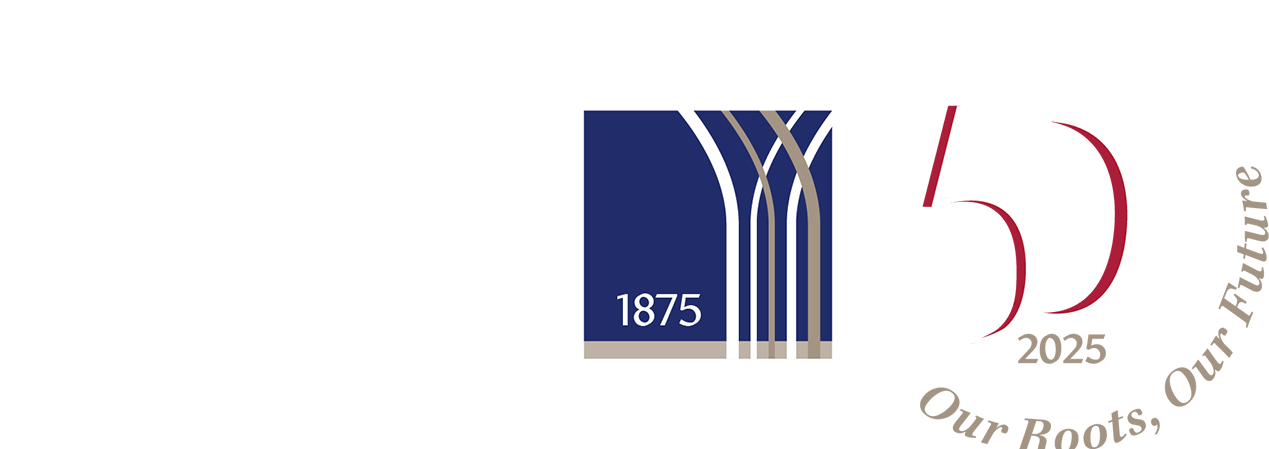
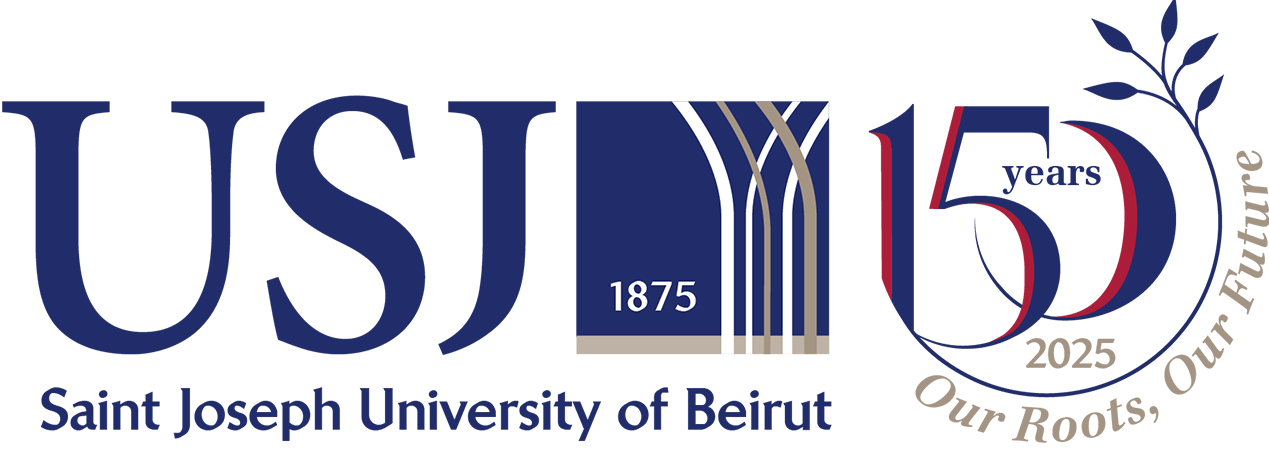
No responses yet